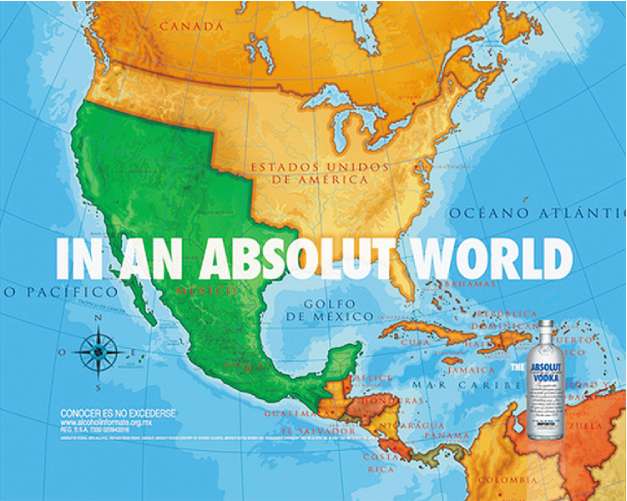Storm in a shot glass as advert redraws map of Americas

A whimsical ad by the makers of Absolut vodka aimed solely at consumers in Mexico has drawn the ire of some sovereignty-sensitive Americans, forcing the company to issue an unusual apology.
The storm in a shot glass was provoked by advertisements that depict an antique map of North America dating back to before the 1848 Mexican-American War, when large swaths of what is now the United States, including all of California and other south-western states, belonged to Mexico. One of a series of ads that run under the tag-line "In an Absolut World", the spot was a cheeky attempt to tap into simmering nationalistic sentiments in Mexico, which chafes at its status as the "poor neighbour" of a country that it once partly owned.
If in Mexico they smiled at the notional re-conquering of their lost lands, the reaction in El Norte has been more mixed than a dirty martini. The company has been assailed by American vodka fans, mostly writing in blogs on the internet, accusing it of inflaming passions about an already touchy political subject: illegal immigration and plans to erect a fence along the existing border.
The Swedish beverage giant, which was bought last week by the French group Pernod Ricard, has even been charged with encouraging Mexicans to enter the US without proper papers.
"We are sorry if we offended anyone," the company said in its own blog on the Absolut website. "This was not our intention. In no way was this meant to offend or disparage, nor does it advocate an altering of borders, nor does it lend support to any anti-American sentiment, nor does it reflect immigration issues. Instead, it hearkens to a time which the population of Mexico may feel was more ideal." Also on the defensive was the company's spokesman in New York, Jeffrey Moran. "This ad certainly has nothing to do with immigration issues or anti-Mexican sentiments," he insisted. "It's based on a historical perspective on what Mexico was once. That's all."
The blogospheric bashing of Absolut was set off by the conservative commentator Michelle Malkin, who posted the Mexican ad on michellemalkin.com, her blog site. From there it quickly migrated to other US sites, including the influential drudgereport.com, further kindling criticism.
"I find this ad deeply offensive and needlessly divisive," one blogger simply named "New Yorker" said on MexicoReporter.com: "I will now make a point of drinking other brands." Another Outraged of the US added: "Absolut is pandering to ignorance, historical illiteracy and Mexican national chauvinism. I'll never drink Absolut again."
That Absolut may have touched a sweet and a sour nerve simultaneously on each side of the border may now seem obvious. While history classes in America teach that the territories were legally purchased from Mexico after the conclusion of the war, many Mexicans still feel they were stolen.
"This advertising basically taps into a very painful episode of Mexico's history, so the cultural code for understanding that is, 'We were robbed,'" commented Eduardo Caccia, an executive at Mindcode, a Mexico City advertising consultancy. "For the US it's different. The understanding for that episode is 'We bought some land. We made a deal.' The same event, but with different meanings."
The loss of what was once Alta California and the other states to the US, including Texas (although it had broken away in 1836 after its own war of independence with Mexico), Arizona and New Mexico, was sealed with the signing of the Treaty of Guadalupe Hidalgo at the end of the war.
Join our commenting forum
Join thought-provoking conversations, follow other Independent readers and see their replies
Comments
Bookmark popover
Removed from bookmarks